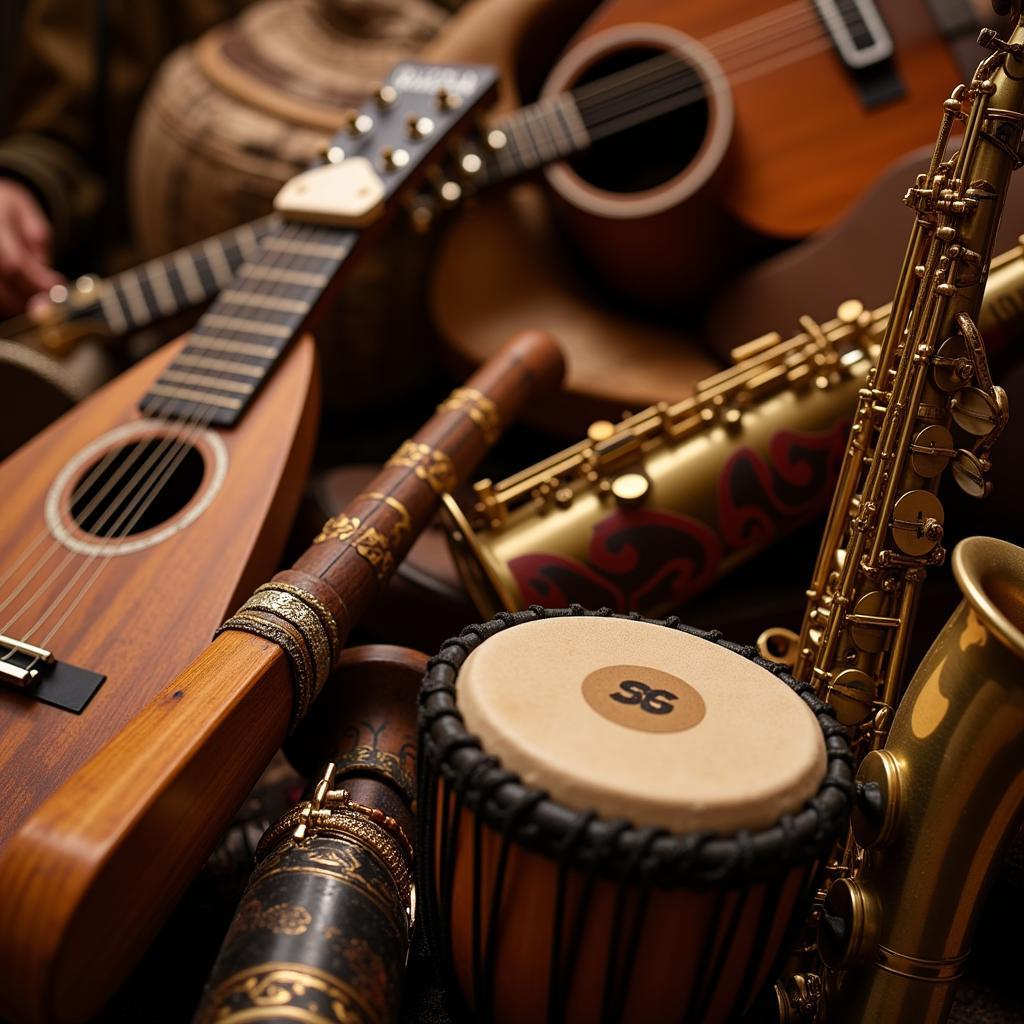Exploring the Vibrant World of African Fusion Music
African Fusion Music, a dynamic and ever-evolving genre, blends traditional African rhythms and melodies with influences from around the globe. This captivating musical style reflects the continent’s rich cultural heritage and its openness to global sounds, creating a unique and exhilarating listening experience. From the bustling streets of Lagos to the serene landscapes of the Serengeti, African fusion music resonates with the pulse of a continent in constant motion. Let’s delve deeper into this captivating genre and discover its diverse forms and influences.
The Roots of African Fusion Music: A Tapestry of Sounds
African fusion music didn’t emerge overnight. It’s a culmination of centuries of musical evolution, drawing from the diverse traditions of the continent’s numerous ethnic groups. The rhythmic complexity of West African drumming, the soulful melodies of East African vocal traditions, and the intricate instrumentation of Southern African music all contribute to the rich tapestry of African fusion. The integration of instruments like the kora, mbira, and djembe with Western instruments such as the guitar, saxophone, and keyboard creates a fascinating blend of sonic textures.
 African Fusion Music Instruments
African Fusion Music Instruments
This fusion isn’t just limited to instruments; it extends to vocal styles and lyrical content as well. Many African fusion artists incorporate traditional storytelling techniques, proverbs, and languages into their music, creating a powerful connection to their cultural roots while addressing contemporary themes.
Early Influences and Pioneers of African Fusion
The early stages of African fusion music were significantly influenced by the arrival of different musical genres from other parts of the world. Highlife music in Ghana, for example, blended traditional Akan music with influences from European brass bands and American jazz. Similarly, in South Africa, the emergence of mbaqanga saw the fusion of Zulu musical traditions with American rock and roll and soul. These early experiments laid the foundation for the diverse and innovative sounds of African fusion that we hear today.
African Fusion Music Today: A Global Phenomenon
African fusion music continues to evolve, constantly incorporating new influences and pushing creative boundaries. The rise of digital music production and distribution has allowed artists to experiment with different sounds and collaborate with musicians from around the world. This global exchange of musical ideas has resulted in a vibrant and dynamic genre that transcends geographical and cultural barriers.
What are some Popular Subgenres of African Fusion?
From Afrobeat to Afro-house, there are countless subgenres within African fusion, each with its unique characteristics and influences. Afrobeat, pioneered by Fela Kuti, combines West African musical styles with funk, jazz, and highlife. Afro-house blends house music with traditional African rhythms and instrumentation. These subgenres demonstrate the versatility and dynamism of African fusion, constantly adapting and evolving to create new and exciting sounds. Looking at the evolution of african dance music 2015 helps us understand the roots of many of today’s popular subgenres.
“The beauty of African fusion music lies in its ability to bridge cultures and connect people through shared musical experiences,” says renowned ethnomusicologist Dr. Abena Osei. “It’s a testament to the power of music to transcend boundaries and create a sense of unity.”
The Future of African Fusion Music: Innovation and Collaboration
The future of African fusion music looks bright, with a new generation of artists pushing the boundaries of the genre. The increasing popularity of African music on the global stage has created new opportunities for collaboration and innovation. As the genre continues to evolve, we can expect to hear even more exciting and groundbreaking sounds emerging from the continent. Perhaps you are looking for something unique, such as exploring the intersection of african dance moroccan music. Even the fashion world embraces the genre, with african fashion show music setting the tone for vibrant displays.
“African fusion is more than just music; it’s a cultural exchange,” says rising star Adebayo Kolawole, a Nigerian Afrobeat artist. “It’s about sharing our stories and connecting with people from all walks of life.”
In conclusion, African fusion music is a testament to the continent’s vibrant musical heritage and its ongoing dialogue with the world. From its rich historical roots to its innovative present, this dynamic genre continues to captivate audiences globally. The future of African fusion music promises even more exciting developments, driven by collaboration, innovation, and the enduring power of music to connect us all. For those interested in South African music, exploring 2000s south african bands can provide a deeper understanding of the country’s unique soundscape.
FAQ
- What is the defining characteristic of African fusion music?
- Who are some prominent African fusion artists?
- Where can I listen to African fusion music?
- How has technology impacted African fusion music?
- What is the cultural significance of African fusion music?
- Are there any festivals dedicated to African fusion music?
- What are some resources for learning more about African fusion music?
Need More Help?
For further assistance or information, please contact us at +255768904061, email us at kaka.mag@gmail.com, or visit us at Mbarali DC Mawindi, Kangaga, Tanzania. Our customer service team is available 24/7. You may also be interested in african brazilian chut video for another perspective on cultural fusion.


